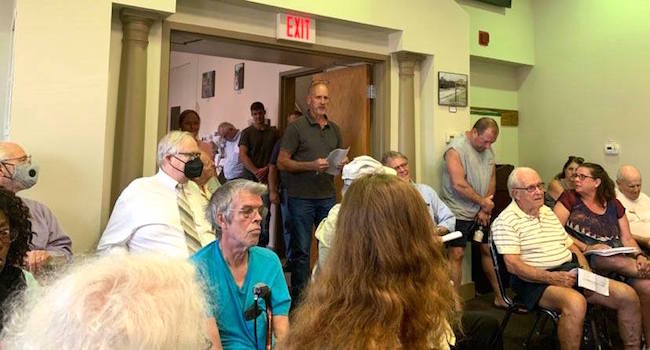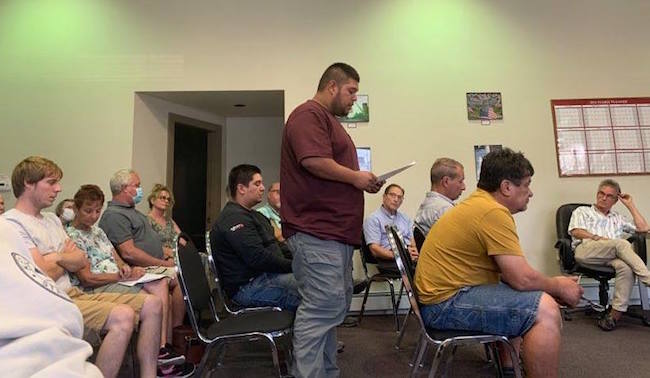Albion rejects proposed law which would set fees for vacant commercial buildings
Village will have Planning Board and committee continue to look for ways to fill business locations

Photos by Tom Rivers: Chad Fabry (standing by door), owner of the former Swan Library site at 4 North Main St., said a proposed law from the village for vacant commercial buildings was “an unreadable piece of junk.” The meeting room was packed on Wednesday evening for a public hearing on the proposed law. Fabry said the proposed law, with fines at $1,000 or more, treats the building owners with vacancies like criminals. “You’re punishing a building owner who is already struggling,” he said.
ALBION – The Village Board, after an outcry against a proposed law assessing fees for vacant commercial buildings, voted to reject the proposed law and will start from scratch in looking for ways to fill business sites in the village.
Albion was considering a law that would have assessed a $250 fee if a commercial site went vacant for more than 30 days, with $1,000 tacked on if the site was empty for a year, $2,000 if it went a second year, $3,000 for a third year and $4,000 for each subsequent year.
The Village Board meeting was packed with building owners for a public hearing on Wednesday. Many of them thanked the board for attempting to address vacancies in the downtown and other business districts. But they said the proposed law wasn’t a good way to deal with the situation.
“I compare it to hitting a fly with a sledgehammer,” said Ron Vendetti, the village former code enforcement officer who owns a building on Bank Street.
Vendetti said the village already has laws for property maintenance that could be used to make the sites look better. The village also could do fire inspections to make sure the sites are safe, Vendetti said.
The law comes a terrible time for the property owners, who haven’t been able to evict non-paying tenants due to a moratorium on evictions and have had many of the business tenants struggle during the Covid-19 pandemic, he said.
Lucy and Tom Miller of Buffalo own a commercial site in Albion and they haven’t been able to rent or sell it for four years, despite trying really hard to market the former banking location.
“Albion is a good place,” Mrs. Miller said during an hour-long public hearing. “It just needs some TLC.”
She echoed the comments that a “punitive” law, costing buildings owners more money during a pandemic, is a bad idea.
“These are hard times right now,” she said. “People are suffering. Until we get through this pandemic, we should be kind to one another.”
Natasha Wasuck, owner of the Tinsel and Lockstone site just north of the canal, urged the board to approve the law. She said other communities – Medina, Le Roy, Troy and many others – have used vacant commercial registries and laws to strongly encourage the building owners to get their space occupied. The vacancies are a detriment to the other merchants in Albion, she said.
She suspected some building owners keep the space unfilled as tax write-offs. That comment drew a response from several others in attendance.
Angel Javier Jr. owns the former hardware store location on Main Street, which has been vacant for nearly two years. Javier said it is costly to bring the historic locations up to date with electricity and other needed infrastructure. He is doing much of the work gradually, with help from his family, to avoid an astronomical bill.
If he paid to have the work done, he doesn’t think he could find tenants who could pay enough rent to justify that expense. He said he has been approached by some possible tenants but they don’t want to pay enough to cover his costs for upgrading the building.
“Projects take money and ingenuity,” he said.
Javier said the building owners all are committed to Albion and want to see the community succeed with a vibrant business district.

Angel Javier Jr., who owns the former hardware store site on Main Street, shares concerns about Albion proposed law. He said building owners like himself are often paying as they go and getting a rehab of a historic site can take years of work.
Gus Revelas, owner of the former Gus’s Soda Shoppe on Main Street, said he has declined some offers to rent his building because he didn’t think those businesses would have been good for the community. His daughter, Athena Nichols, is an art teacher and she said she is looking to open a business in the location at some point.
She told the board her family – which has owned the site for more than a century – continues to pay taxes and maintain the location. They shouldn’t be penalized because the building isn’t currently used for a business, she said.
“You are creating heartache and problems for people who want to continue their business,” she said.
Other speakers questioned the wording in the law, and what they saw as unconstitutional provisions about entering the buildings without a warrant for inspections.
Corey Black, one of the downtown building owners, was among the speakers who said the proposed law was “very ambiguous” and wasn’t clear on what is considered a “vacancy.” In one section it says an unoccupied “portion” of the building could make the location considered vacant, but another spot said it applies only to the main floor of the building.
Black said the law could force building owners to be less choosey about tenants, which could be detrimental to the downtown and community.
“You can’t legislate yourselves out of a problem,” Black said. “We can’t legislate ourselves to look like Medina.”
Karen Conn, a Planning Board member, said that board had worked on the proposal for about a year, looking for ways to encourage the reuse of the buildings. She welcomed more input from the building owners to help encourage a vibrant downtown and other business districts in the village. The Planning Board’s intention wasn’t to make it more difficult for the property owners.
Michael Bonafede owns three of the historic locations in the downtown. When he and his wife Judy Koehler bought the Pratt and Day buildings about 15 years ago, the sites only had one tenant. Now they have 11 and that includes the Downtown Browsery with 40 vendors.
Bonafede said Albion has long wanted to have a more vibrant business district, but has struggled to chart a course with everyone working together.
“I admire what you’re trying to do,” Bonafede told the Village Board. “We just don’t know how to go forward as a community.”
He said “polarization” holds the community back. He said the proposed law would be a “huge hardship” on the building owners. There are other options and he cited a report from the National Trust for Historic Preservation which provided a detailed report for Albion’s Main Street about a decade ago.
Bonafede said there are many resources that would assist Albion in a resurgence.
Mayor Eileen Banker thanked the building and business owners for attending the meeting and voicing their opinions. There was an initial public hearing about the law last month and there weren’t any comments. The board decided to send a copy of the proposed law to all the property owners in the business districts in the village so they would be aware of the proposal and to give them a chance to provide input.
“I’m thrilled you are all here,” Banker told the crowd. “This is absolutely what we want. We want to make it a community effort.”









































































